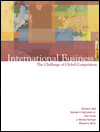 |  International Business : The Challenge of Global Competition, 8/e Donald Ball
Wendell H. McCulloch,
California State University Long Beach
Paul L. Frantz,
California State University Long Beach
Michael Geringer,
California Polytechnic State University
Michael S. Minor,
University of Texas Pan American
Physical and Environmental Forces
Internet AssignmentsStudents: Included here are some internet/case assignments that you can use to review
or that your instructor may give as assignments. Your instructors have been
given the answers to these questions and may choose to give them out to you
or not.
This case is designed to:
- Expose you to some of the characteristics of offshore banking and offshore
companies;
- Provide you with insight into how international companies might utilize
offshore banking and offshore companies; and
- Allow you to explore the relationship between the establishment of offshore
banks and offshore companies, and geographic location and characteristics.
DISCLAIMER: THIS CASE IN NO WAY SUPPORTS OR ENDORSES THE USE OF OFFSHORE BANKING
OR OFFSHORE COMPANIES TO ENGAGE IN ANY ILLEGAL ACTIVITY.
The British Virgin Islands (BVI) is a group of islands located in the Caribbean
Sea. They are sparsely populated with the total population under 20,000. With
that small population, there are over 300,000 companies registered in BVI's
jurisdiction. That's over 15 companies per resident! Much of the international
interest in the BVI has to do with offshore banking and offshore companies.
When you hear the terms "offshore banking" and "offshore company" what to you
think of? If your answer is money laundering, criminal activity, drug lords,
illegal operations, etc., your view is shared by many others. While both offshore
banking and offshore companies have been linked to numerous illegal underground
activities, they potentially offer opportunities and advantages to bona fide
businesses.
Offshore banking encompasses two distinct concepts, legal and mechanical. In
the legal sense, offshore banking refers to a bank that is licensed to do business
only outside of the jurisdiction in which it is chartered and licensed. What
this means is that a bank holding an offshore banking license may engage in
some, most or all activities normally carried on by any other bank, but cannot
offer those same services to the residents of the jurisdiction in which the
bank is chartered and licensed. For example, a licensed offshore bank in the
BVI may offer its services to anyone who is not a resident of the BVI, but cannot
offer those same services to residents of the BVI.
In the functional sense, an offshore bank is any bank that located outside
of the country in which the depositor lives. That means that any bank outside
of the United States is considered to be an offshore bank for those who are
residents of the United States.
Regardless of how a bank is structured, where it is licensed and chartered,
or where it does business, all banks use the same channels to facilitate the
movement of funds domestically and internationally. Therefore, all banks in
the world are indirectly connected through their correspondent and inter-bank
relationships.
An offshore company, sometimes referred to as an international business company
or IBC, is a legal entity whose beneficial ownership and business activities
lie outside of the country of its registration. An offshore company generally
does no business, pays no taxes and is for the most part free of trade and other
restrictions such as exchange control, trade licensing and public requirements
in the country in which it is incorporated and resident. Oftentimes, offshore
businesses are used to minimize taxes, protect assets, bypass trade and other
legal regulations, and/or maintain confidentiality about certain activities.
For example, offshore companies can be used to: (1) conduct business without
having to report to agencies of the domestic government; (2) bypass domestic
restrictions on borrowing and lending; (3) preserve confidentiality of the affairs
of the offshore company and its investors, shareholders, clients or associates;
(4) make investments, shift them or sell or trade them without having to report
to any governmental entity; (5) conduct foreign trade activities in any field
including currencies, stocks, bonds, loans or merchandise; (6) purchase goods
from one country and sell those goods to another country with profits held in
a third country; and (7) maintain deposits in any bank in any country the company
chooses.
A distinguishing feature of both an offshore bank and an offshore company,
is the separation of their legal jurisdiction from the jurisdiction of their
depositors or owners. This is significant because no country may impose its
laws on another country without that country's consent and cooperation. In addition,
no country may investigate an individual or a company located in another country
without the consent and cooperation of the country in which the investigation
is to be conducted.
Case Instructions:
Answer the following questions concerning offshore activities in the British
Virgin Islands.
- What are some of the benefits of establishing offshore operations in the
British Virgin Islands. Go here http://www.bvi.org/incorp_services.html
for the answer.
- Describe the geographical characteristics of the British Virgin Islands.
Go here http://www.cia.gov/cia/publications/factbook/geos/vi.html
for the answer.
- Explain how the geography of the British Virgin Islands makes it an ideal
location for the establishment of offshore business activities.
|
|




 2002 McGraw-Hill Higher Education
2002 McGraw-Hill Higher Education